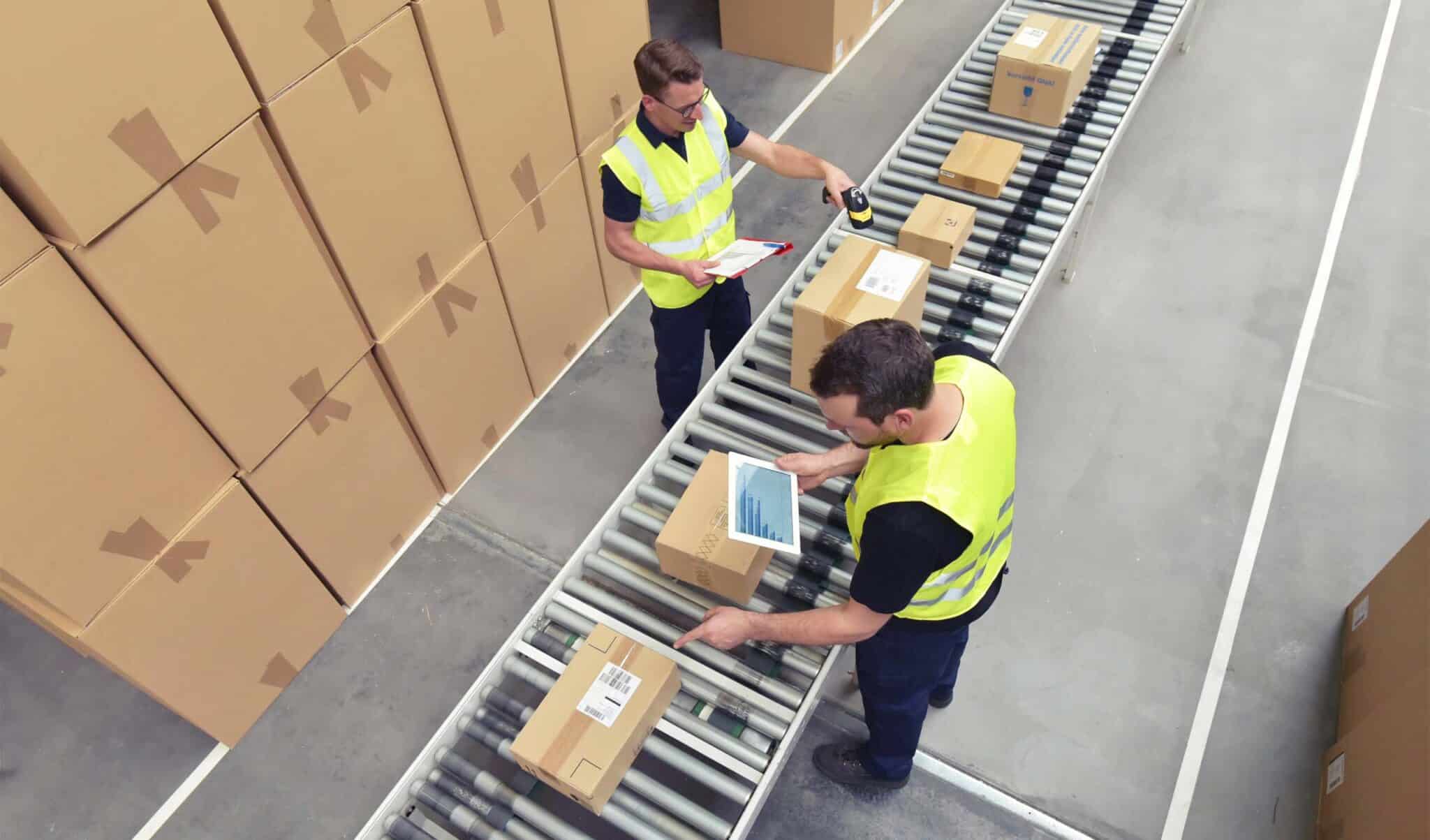In supply chain management, the terms “shipping” and “logistics” are frequently used interchangeably, so it’s easy to think that they address the same subject—but they don’t.
While both are essential components of getting products from suppliers to customers, they operate at different scales and encompass different responsibilities within the supply chain. Understanding the difference between shipping and logistics is crucial for businesses looking to optimize their operations, reduce costs, and improve customer satisfaction.
Whether you’re managing B2B or B2C operations, knowing how these functions work together—and where they differ—can significantly impact your bottom line and operational efficiency. In this blog, you’ll learn about what shipping and logistics are, what they have in common, and what sets them apart.
Key Takeaways
- Shipping focuses specifically on transportation and delivery, while logistics encompasses the entire supply chain from supplier sourcing to customer delivery
- Effective operations require both tactical shipping execution and strategic logistics planning, working together toward common business objectives
- Modern logistics success depends on integrated systems that provide real-time visibility across shipping, warehousing, and fulfillment operations
What is Shipping?
Shipping refers to the specific process of physically moving goods and materials from one location to another. Companies like UPS and FedEx, also known as carriers, offer a variety of shipping services.
This transportation-focused function involves the actual movement of packaged products from a distribution center, warehouse, or fulfillment facility to their final destination, whether that’s a retail store, business customer, or individual consumer. So if you transport your items by water, land, or air, the process is always considered shipping.
4 Key Components of Shipping
Four key components make up shipping management.
1. Carrier Management
Working with transportation providers like UPS, FedEx, DHL, and freight carriers to move goods via ground, air, or ocean transport. Carrier management includes negotiating rates, managing service agreements and contracts, and monitoring carrier performance.
2. Transportation Execution
Transportation execution refers to the actual movement of goods using various shipping methods, from standard ground delivery to expedited air transport, freight shipping, and specialized services like temperature-controlled or hazardous materials transportation.
3. Shipping Operations
Shipping operations refer to day-to-day activities, including package preparation, label creation, shipment tracking, delivery confirmation, and handling returns or damaged goods.
4. Cost & Operations Management
Monitoring shipping expenses, analyzing carrier and shipping performance, and optimizing shipping methods to balance cost and service levels. This includes understanding shipping surcharges and their impact on total transportation costs.
Shipping teams have a lot of responsibility, focusing primarily on the final mile of product delivery, ensuring that once items are packaged and ready for transport, they reach their destination safely, on time, and cost-effectively.
What is Logistics?
Logistics is the management of the entire operation.
Sometimes referred to as shipping logistics, logistics encompasses the comprehensive planning, implementation, and management of the entire flow of goods, services, and information from the point of origin to the point of consumption. Unlike shipping’s narrow focus on transportation, logistics takes a complete view of the entire supply chain ecosystem.
Logistics management involves:
- Demand Planning: Forecasting customer needs to optimize inventory levels and production schedules
- Supplier Management: Building and maintaining relationships with vendors and service providers
- Technology Integration: Implementing systems for visibility, tracking, and automation across the supply chain
- Performance Analytics: Measuring and optimizing key metrics like delivery times, costs, and customer satisfaction
- Risk Management: Identifying and mitigating potential disruptions to supply chain operations
It coordinates all activities required to move products efficiently through the supply chain, including procurement, warehousing, inventory management, order fulfillment, and transportation. This broader scope requires strategic planning and coordination across multiple departments and external partners.
Understanding The 3 Types of Logistics
Logistics management is broken down into 3 categories:
- Inbound Logistics: Managing the flow of materials and goods from suppliers to your business. This includes supplier relationship management, procurement processes, receiving operations, and inventory planning. Inbound logistics ensures that raw materials, components, or finished goods arrive when needed and in the right quantities.
- Internal Logistics: Coordinating the movement and storage of goods within your organization. This includes warehouse management, inventory control, order processing, packaging operations, and internal material handling. Internal logistics optimizes how products move through your facilities from receipt to shipment.
- Outbound Logistics: Managing the distribution of finished products from your business to customers. This includes order fulfillment, packaging, shipping coordination, delivery management, and customer service. Outbound logistics ensures products reach customers efficiently while minimizing costs and maximizing satisfaction.
What is the Difference Between Shipping and Logistics?
The fundamental difference between shipping and logistics lies in scope, timing, and strategic focus. While shipping represents a specific function within the supply chain, logistics encompasses the entire operational strategy.
Scope and Scale
Shipping operates with a narrow, transportation-focused scope. Shipping teams concentrate on the physical movement of goods from point A to point B, managing carrier relationships, optimizing delivery methods, and ensuring packages reach their destinations. This function typically begins once products are packaged and ready for transport.
Logistics operates with a comprehensive, enterprise-wide scope. Logistics professionals manage the entire product journey from initial supplier sourcing through final customer delivery, coordinating multiple functions including procurement, warehousing, inventory management, and distribution planning.
Timeline and Integration
Shipping engages primarily during the final stages of the fulfillment process, focusing on transportation execution and delivery management. Shipping decisions often center on immediate needs like carrier selection, delivery speed, and transportation costs.
Logistics engages throughout the entire supply chain lifecycle, from strategic planning and supplier selection to ongoing optimization and performance management. Logistics decisions consider long-term implications and cross-functional impacts on the entire operation.
Strategic vs. Tactical Focus
Shipping typically takes a tactical approach, focusing on executing transportation efficiently within established parameters. This includes optimizing carrier performance, managing shipping costs, and ensuring delivery reliability.
Logistics takes a strategic approach, analyzing the entire supply chain to identify optimization opportunities, cost reduction potential, and service improvements. This includes comprehensive parcel spend management that extends beyond basic transportation costs.
Relationship to Overall Business Goals
Shipping contributes to business success by ensuring reliable, cost-effective product delivery that meets customer expectations and supports sales objectives.
Logistics drives business success by optimizing the entire supply chain to reduce total costs, improve operational efficiency, enhance customer satisfaction, and support strategic business growth.
What Do Shipping And Logistics Have In Common?
Both shipping and logistics management deal with the transportation of documents, goods, or materials to the end customer. Both are equally important in the supply chain and work together with the contracted carrier(s) to maintain a professional relationship and ensure all agreement terms are honored by both parties.
At the end of the day, both shipping and logistics share the same goal: to get your product into your customer’s hands, safely and on time. Without either, it’s impossible to maintain an efficient, effective supply chain.
Transform Your Shipping and Logistics Operations
Optimizing both shipping and logistics requires expertise, advanced parcel spend management technology, and comprehensive data analysis to identify the most impactful improvement opportunities. Whether you’re looking to reduce transportation costs, improve delivery performance, or optimize your entire logistics operation, the key is taking a systematic approach that considers both immediate shipping needs and long-term strategic objectives. To uncover significant cost savings and efficiency improvements, request a demo of our shipping and logistics management platform.




